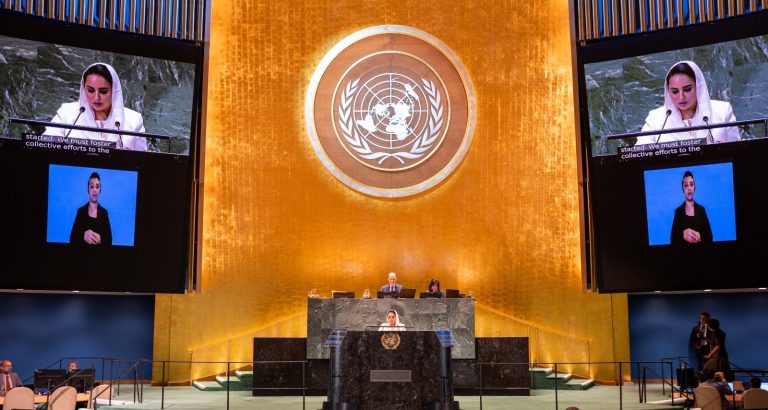At the UN’s Summit of the Future, Deemah AlYahya, Secretary-General of the Digital Cooperation Organization (DCO), highlighted the pressing global challenge of the digital divide, emphasising its multifaceted nature. Speaking in New York during the 79th UN General Assembly (UNGA), AlYahya praised the adoption of the ‘Pact for the Future’ and the ‘Global Digital Compact’ while calling for urgent, collective action to ensure no community is left behind.
AlYahya noted that the digital divide encompasses several critical gaps, including digital intelligence, computing power, skills, and gender disparity. “The AI and computing divide represents a significant barrier, as some nations advance rapidly in AI innovation and deployment, while others struggle to keep pace,” she said.
The DCO chief stressed the need for immediate intervention to tackle these challenges. “The gender digital divide continues to limit women’s access to technology and opportunities, while the skills divide leaves many without the digital competencies essential for success in a fast-evolving economy. If we do not address these interconnected challenges, we risk leaving entire communities behind.”
AlYahya praised the newly adopted Global Digital Compact, describing it as a vital framework for the future. “The Compact lays out an ambitious roadmap for an inclusive, open, sustainable, fair, safe, and secure digital future for all,” she said. However, she added that “The real challenge is translating these goals, principles, objectives, and commitments into action, especially as we strive to achieve the Sustainable Development Goals (SDGs).”
As part of its efforts to address the digital divide, the DCO launched the Digital Economy Navigator (DEN) at the summit. AlYahya introduced DEN as a new tool that provides a comprehensive analysis of digital economy performance across 50 countries. “This initiative is just one of the many ways we are turning the principles of the Global Digital Compact into action,” she said.
DEN evaluates digital economy performance through three core dimensions: Digital Enablers, Digital Business, and Digital Society. Each dimension is broken down into 10 pillars, which synthesise and summarise key aspects of a country’s digital economy. The tool uses over 100 indicators from respected sources and proprietary survey data from over 27,000 participants across 50 countries.
AlYahya underlined that DEN is only the beginning of broader efforts to bridge the global digital divide. “In the spirit of networked multilateralism, we must foster collective efforts to achieve the GDC’s ambitious goals and commitments. I call upon every country, organisation, and individual to join forces in this critical endeavour.”
Beyond launching DEN, the DCO signed an agreement with the United Nations Development Program (UNDP) to enhance global digital cooperation and speed up digital transformation. This partnership aims to support efforts to achieve the United Nations’ SDGs by 2030.
Additionally, the DCO signed a memorandum of understanding with the League of Arab States (LAS) to accelerate the development of an inclusive and sustainable digital economy in the region. The agreement will focus on enhancing cooperation, exchanging expertise, and driving economic development through digital transformation.
AlYahya concluded her address by reiterating the need for collective action to tackle the global digital divide and ensure all nations benefit from the advancements in technology.



